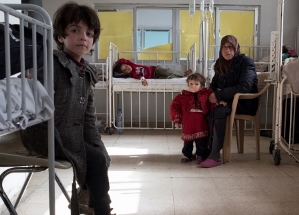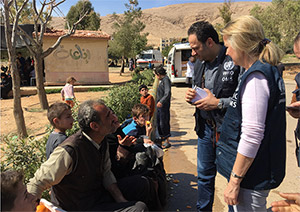WHO concerned about suspected chemical attacks in Syria
11 April 2018 – WHO is deeply alarmed by reports of the suspected use of toxic chemicals in Douma city, East Ghouta. According to reports from Health Cluster partners, during the shelling of Douma on Saturday, an estimated 500 patients presented to health facilities exhibiting signs and symptoms consistent with exposure to toxic chemicals. In particular, there were signs of severe irritation of mucous membranes, respiratory failure and disruption to central nervous systems of those exposed.
More than 70 people sheltering in basements have reportedly died, with 43 of those deaths related to symptoms consistent with exposure to highly toxic chemicals. Two health facilities were also reportedly affected by these attacks.
WHO reminds parties to the conflict of their obligation to refrain from attacking medical facilities and personnel as per Security Council Resolution 2286 (2016). Any use of chemical weapons to cause harm is illegal under international law. Global norms against chemical weapons reflect a particular abhorrence to their disproportionate harm to the eldest, the most infirm, and the youngest among us.
Japan boosts assistance for vital health care in Syria
 Children from East Ghouta at Damascus Paediatric Hospital in March 2018. With support from Japan, the Emergency Department will soon be fully repaired and equipped. © WHO SyriaDamascus, 5 April 2018 – The Government of Japan has committed a total of US$ 5 million in new assistance to the World Health Organization (WHO) to strengthen primary health care for vulnerable populations in northern Syria, and to improve secondary and tertiary care for children from across the country, including those who come from East Ghouta.
Children from East Ghouta at Damascus Paediatric Hospital in March 2018. With support from Japan, the Emergency Department will soon be fully repaired and equipped. © WHO SyriaDamascus, 5 April 2018 – The Government of Japan has committed a total of US$ 5 million in new assistance to the World Health Organization (WHO) to strengthen primary health care for vulnerable populations in northern Syria, and to improve secondary and tertiary care for children from across the country, including those who come from East Ghouta.
US$ 3.5 million of this package will be used to equip and rehabilitate the Emergency Department of the Damascus Paediatric Hospital, a key health institution providing vital support to critically ill children. Essential medical equipment will also be provided to the Aleppo Paediatric Hospital and the Paediatric and Obstetrics Hospital in Latakia.
Explosive hazards pose fatal risks to children and families in Syria
 A physiotherapist at the Directorate of Disability and Physical Rehabilitation in Damascus stands next to Gofran, 15. She lost her leg after stepping on a landmine in northeast SyriaDamascus, 4 April 2018 – Marking the International Day for Mine Awareness and Assistance in Mine Action, the World Health Organization (WHO) and UNICEF are calling for concerted international action in response to the devastating health consequences of explosive hazards in Syria. More than 8 million people are exposed to explosive hazards in Syria, including over 3 million children.
A physiotherapist at the Directorate of Disability and Physical Rehabilitation in Damascus stands next to Gofran, 15. She lost her leg after stepping on a landmine in northeast SyriaDamascus, 4 April 2018 – Marking the International Day for Mine Awareness and Assistance in Mine Action, the World Health Organization (WHO) and UNICEF are calling for concerted international action in response to the devastating health consequences of explosive hazards in Syria. More than 8 million people are exposed to explosive hazards in Syria, including over 3 million children.
In 2017, at least 910 children were killed and 361 children were maimed in Syria, including by explosive remnants of war and victim-activated improvised explosive devices. In the first 2 months of 2018 alone, 1000 children were reportedly killed or injured in intensifying violence.
WHO responds to critical health needs of thousands of Syrians fleeing East Ghouta
 21 March 2018, Damascus – The World Health Organization (WHO) is supporting the delivery of critical health care for Syrians fleeing the escalating violence in besieged East Ghouta. WHO has activated an emergency operations centre that works around the clock to assist the tens of thousands of Syrians from East Ghouta who have taken refuge in collective shelters in Rural Damascus.
21 March 2018, Damascus – The World Health Organization (WHO) is supporting the delivery of critical health care for Syrians fleeing the escalating violence in besieged East Ghouta. WHO has activated an emergency operations centre that works around the clock to assist the tens of thousands of Syrians from East Ghouta who have taken refuge in collective shelters in Rural Damascus.


